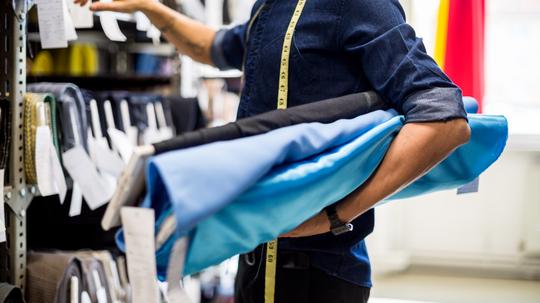
As the summer begins to wind down, cooler temperatures are approaching, and with them, the return of “sweater weather.” Fall is hands-down the best season for fashion, with staples like oversized scarves, knit cardigans, and cute ankle booties.
Bostonians are planning to revamp their tired, summer wardrobes—and you bet fashion companies are getting ready, too. In the coming weeks, big brands will churn out cheap products, from catwalk to storefront as quickly as possible, in order to stay on top of the latest trends. This is called “fast fashion,” and it’s a major contributor to global pollution.
Did you know that one garbage truck of textiles is taken to the landfill every second?
Or how about that the fashion industry creates 92 million tons of solid waste each year?
Or that it takes 2,700 liters of water just to make a single cotton shirt?
With an estimated market value of $406 billion, this apparently unchanging industry needs a disruption.
Kai Potter is a rising senior at Harvard University. She is also an entrepreneur and the founder of Honest Closet. The company was born out of her desire to, like most of us, revamp her wardrobe before the start of the new year.
“I spent around $500 online at Asos, Zara, whatever, and I just realized I still wasn’t happy with my wardrobe,” Potter said. “I still felt like I didn’t have things to wear. I’d wear the thing a few times, and then I’d just get bored of it. Or just realize the stuff wasn’t good quality.”
When clothes don’t last, consumers are forced to buy more and more. But Americans recycle or donate only 15 percent of their used clothing, and the rest—about 10.5 million tons a year—goes into landfills, giving textiles one of the poorest recycling rates of any reusable material, Elizabeth Cline wrote in the Atlantic in 2014.
The industry also consumes resources from various sectors: energy, water, raw materials.
After researching the harmful effects of fast fashion, Potter challenged herself to stop buying new clothes for eight months. If she needed anything, she’d go to Goodwill. Potter then created a Facebook group for Harvard students to buy and sell their used clothing, which snowballed into a campus event called the “thrift market party.”
Now, the company has pivoted. Instead of hosting campus events or running a buying and selling group, Honest Closet is a fashion club based around a weekly email newsletter.
“I was thinking about content,” Potter said. “And I realized it doesn’t matter how many events I do, or how much I say, ‘so-and-so company is bad’ or whatever. It doesn’t matter if at the end of the day, you still have media powerhouses saying ‘10 hot things you must buy for the summer.’ I realized I’d really picked up the symptom of the problem, which is the overconsumption of clothes, and the root of the problem is the media industry at large. I thought, ‘What if Honest Closet could turn into a type of media company?’”
The goal of Honest Closet today is to educate the public on sustainable fashion trends without alienating those who simply want clothing tips and tricks, career advice, information on the latest beauty trends or more overall lifestyle content with ethical values.
The mission of Honest Closet has stayed the same: to disrupt fast fashion through education. By changing people’s mindsets about the clothing industry, Potter hopes to increase the life cycle of individual clothing items and strive for a circular fashion industry, where instead of buying cheap clothes and throwing them away, clothes are high-quality, reusable and recyclable.
Potter isn’t the only local founder in this space. Ahmed Malik, co-founder of fashion startup Radian Jeans, is also designing for a more sustainable fashion industry. Malik believes that through high-tech fabric and treatment, like CoolMax AllSeason Technology and nanotechnology-based fabric treatment, her jeans will last longer—and minimize pollution in the process.
“We believe in well-made products that will last longer to minimize impact on the environment,” said Malik.
And Radian Janes’ price point won’t break the bank. With a preorder price of $69, customers can buy a pair of pants that won’t need to be thrown away after one wear.
Across the river in Cambridge, he Advanced Functional Fabrics of America (AFFOA) is working on a particularly technical solution: Its engineers are developing sustainable, high-tech textiles.
AFFOA has created a fiber that produces various colors based on shape and light reflection. This process doesn’t involve dyeing, which is water-intensive and has led to pollution of local water supplies in China and India.
Tosha Hays, AFFOA’s chief product officer, believes that startups can offer the solutions needed to fix the fast fashion epidemic.
“For instance, Everlane is completely transparent. They show the cost and you see exactly what they pay to make the clothes. That’s an example of changing the culture of the fashion industry. And it takes startups like that,” said Hays. “Rent the Runway uses clothing as a service, and I don’t have to buy something new. I can rent it. It’s like I’m sharing my wardrobe with other people, but I’m okay with that. And I don’t feel like I’m over-consuming.”
Hays likes the idea of transforming clothing from a consumer good to a consumer service. Her company is working on creating apparel like trousers and T-shirts that can change colors or patterns through an app, which will satisfy consumers’ need for something new.
“We’re really interested in thinking about fashion or apparel as a service. Rather than, ‘I buy it, I throw it away,’ right?” Hays said. “We’re going to produce this in three weeks and put it out in the marketplace. [AFFOA] is more about, ‘I’m going to buy a shirt. I’m going to buy one shirt, it can be black, I can download patterns to it, I can have it for a longer period of time.’”








